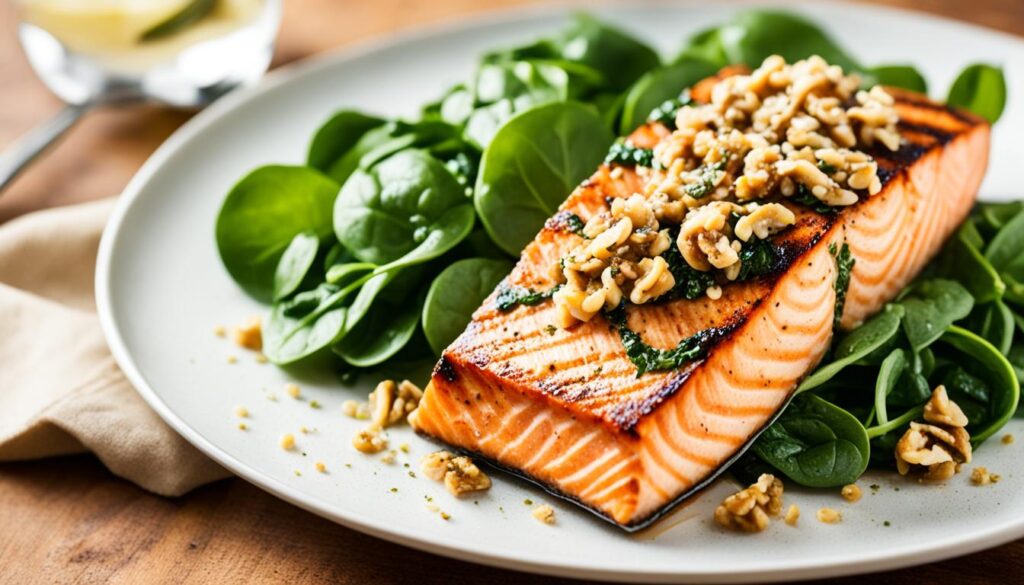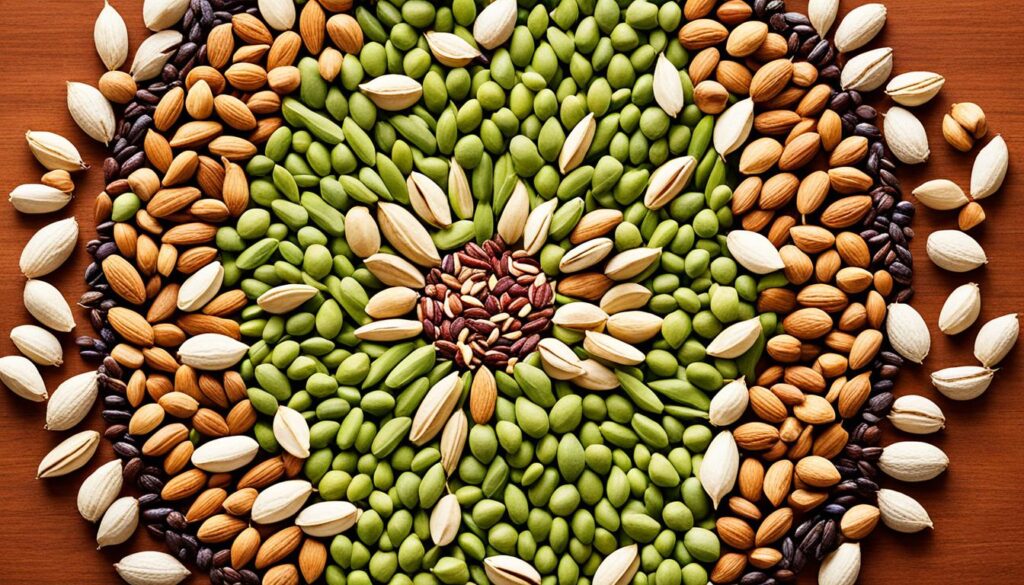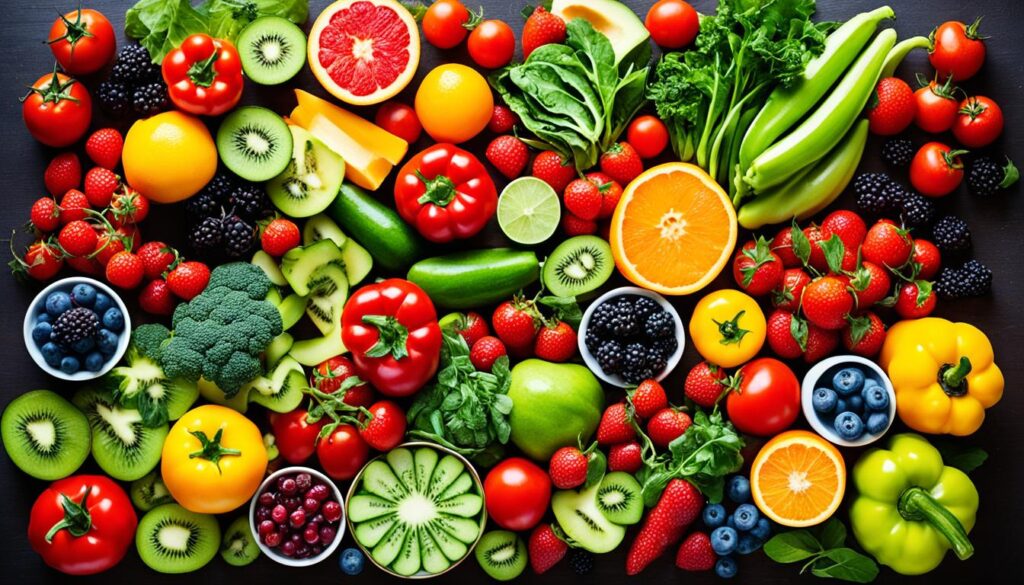Inflammation is a natural way your body protects itself. But, chronic inflammation can cause health problems. Luckily, anti-inflammatory foods can help you fight inflammation and boost your health. This article will share a detailed anti-inflammatory foods list. It aims to give you the knowledge and motivation to add these powerful ingredients to your inflammation-fighting diet.
Table of Contents
ToggleKey Takeaways
- Discover the top anti-inflammatory ingredients that can help reduce swelling and pain
- Learn about the benefits of an anti-inflammatory diet and how it can support your health
- Explore a wide range of natural remedies for inflammation that you can easily add to your meals
- Understand the importance of whole food anti-inflammatory diet for overall well-being
- Find arthritis-friendly foods that can help manage joint pain and stiffness
The Power of Anti-Inflammatory Foods
Inflammation is how our body fights off injury, illness, and infection. But, if it happens too often, it can cause serious health problems. Eating an anti-inflammatory diet with foods that fight inflammation can help. These foods are full of nutrients and can make you healthier.
Understanding the Role of Inflammation
Inflammation is a way our body protects itself and starts to heal. It can start from a bad diet, stress, not moving enough, or being exposed to harmful substances. While some inflammation is good, too much can be bad for us.
Benefits of an Anti-Inflammatory Diet
Eating a diet full of anti-inflammatory foods has many benefits:
- It lowers the risk of heart disease, cancer, and type 2 diabetes
- It makes joints and muscles work better, easing pain and stiffness
- It helps your brain work better and improves your mood
- It makes your immune system stronger and boosts your overall health
Adding anti-inflammatory foods to your meals is a natural way to fight inflammation. This can lead to better health overall.
Anti-Inflammatory Foods List
When fighting inflammation and boosting health, eating foods that reduce inflammation is key. These foods that combat inflammation can lower the risk of chronic diseases. They also help ease symptoms of conditions like arthritis. Plus, they support a diet that fights inflammation.
Here’s a list of anti-inflammatory foods you can add to your meals:
- Fatty fish like salmon, mackerel, and sardines, which are high in omega-3 fatty acids
- Leafy green vegetables such as spinach, kale, and collard greens, packed with antioxidants and anti-inflammatory ingredients
- Berries, including blueberries, raspberries, and strawberries, bursting with antioxidants
- Turmeric, a potent anti-inflammatory spice that contains the active compound curcumin
- Ginger, another powerful anti-inflammatory herb with numerous health benefits
- Nuts and seeds, such as walnuts, almonds, and flaxseeds, rich in omega-3s and other anti-inflammatory nutrients
- Whole grains like quinoa, brown rice, and oats, providing fiber and complex carbohydrates
- Legumes, including lentils, chickpeas, and black beans, packed with fiber, protein, and anti-inflammatory properties
- Avocados, a nutrient-dense arthritis-friendly food high in healthy fats and antioxidants
- Olive oil, a anti-inflammatory ingredient that can replace less healthy cooking oils
Adding these anti-inflammatory foods to your diet can help you fight inflammation naturally. It supports your health and may ease symptoms of chronic conditions.
Omega-3 Rich Foods
Omega-3 fatty acids are known for their strong anti-inflammatory effects. They are key to fighting inflammation and boosting health. We’ll look at how salmon, fatty fish, walnuts, and flaxseeds can help.
Salmon and Other Fatty Fish
Fatty fish like salmon, mackerel, and sardines are full of omega-3s. These include EPA and DHA. These nutrients help reduce inflammation and ease symptoms of inflammatory conditions.
Eating Anti-Inflammatory Foods List like salmon often can fight inflammation. It supports your overall health.
Walnuts and Flaxseeds
Plant-based omega-3 sources, such as walnuts and flaxseeds, also help reduce inflammation. Walnuts are loaded with alpha-linolenic acid (ALA), an omega-3 linked to less inflammation and better heart health.
Flaxseeds are another great source of ALA. They’re key to an Inflammation-Fighting Diet. Adding these Foods that Combat Inflammation to your diet can bring big anti-inflammatory benefits.

Choosing omega-3-rich foods is a big step towards fighting inflammation and improving health. Whether it’s fatty fish, walnuts, or flaxseeds, these Anti-Inflammatory Foods List are great for a healthy diet.
Antioxidant-Packed Fruits and Veggies
When it comes to an anti-inflammatory diet, fruits and vegetables rich in antioxidants are key. These foods help fight free radicals and lower inflammation. This can lead to better health naturally.
Some of the top anti-inflammatory foods include:
- Berries (blueberries, raspberries, blackberries, and strawberries)
- Leafy greens (spinach, kale, collard greens, and arugula)
- Citrus fruits (oranges, grapefruit, lemons, and limes)
- Tomatoes
- Bell peppers
- Broccoli
- Pineapple
These whole food powerhouses are full of vitamins, minerals, and plant compounds. They work together to fight inflammation at the cellular level. Adding a mix of these vibrant, anti-inflammatory foods to your diet can greatly improve your health and well-being.
“Eating a diet rich in antioxidant-rich fruits and vegetables is one of the best ways to reduce inflammation and promote optimal health.”
Spices and Herbs with Anti-Inflammatory Properties
Some spices and herbs are great for fighting inflammation. Turmeric and ginger are two examples. They have compounds that help reduce inflammation naturally.
Turmeric and Ginger
Turmeric is known for its bright yellow color. It has curcumin, which fights inflammation well. Studies show curcumin can help people with arthritis.
Ginger has gingerol, which also fights inflammation. It can ease pain from different inflammatory conditions.
Green Tea and Matcha
Green tea and matcha are great for fighting inflammation too. They have polyphenols, especially EGCG. This helps reduce inflammation and protect against arthritis.
| Spice/Herb | Active Compound | Anti-Inflammatory Benefits |
|---|---|---|
| Turmeric | Curcumin | Reduces inflammation, especially helpful for arthritis |
| Ginger | Gingerol | Exhibits anti-inflammatory effects, can provide relief for various inflammatory conditions |
| Green Tea | EGCG | Possesses potent anti-inflammatory properties, may offer protection against arthritis-related issues |
| Matcha | EGCG | Similar to green tea, matcha is rich in EGCG and can also help reduce inflammation |
Adding these Anti-Inflammatory Ingredients to your meals is a great way to fight inflammation. Turmeric, ginger, green tea, and matcha are easy to use and can help with inflammation and arthritis.
Whole Grains and Legumes
Whole grains and legumes are key in fighting inflammation and boosting health. They are arthritis-friendly and vital for a Whole Food Anti-Inflammatory Diet.
Quinoa and Brown Rice: Ancient Grains for Modern Wellness
Quinoa and brown rice are top whole grains for fighting inflammation. Quinoa is gluten-free and full of fiber, protein, and minerals like magnesium and iron. It’s great for fighting inflammation. Brown rice is a better choice than refined grains, offering complex carbs, B vitamins, and ferulic acid.
Lentils and Black Beans: Legumes to the Rescue
Lentils and black beans are Foods that Combat Inflammation. They’re high in fiber, protein, and nutrients. Lentils have folate, magnesium, and iron. Black beans are full of anthocyanins, a strong antioxidant. Adding these legumes to your meals can lower inflammation and boost health.
| Whole Grain | Nutrient Highlights | Anti-Inflammatory Benefits |
|---|---|---|
| Quinoa | Fiber, Protein, Magnesium, Iron | Gluten-free, High in Antioxidants |
| Brown Rice | Complex Carbohydrates, B Vitamins, Ferulic Acid | Supports Gut Health, Reduces Oxidative Stress |
| Lentils | Fiber, Protein, Folate, Magnesium, Iron | Promotes Anti-Inflammatory Response, Supports Cardiovascular Health |
| Black Beans | Fiber, Protein, Anthocyanins | Rich in Antioxidants, Helps Regulate Blood Sugar Levels |
Adding Whole Grains and Legumes to your meals helps fight inflammation and boosts health. Try these Arthritis-Friendly Foods and see how a Whole Food Anti-Inflammatory Diet can change your life.
Olive Oil and Avocados
Olive oil and avocados are top foods for fighting inflammation. They are full of healthy fats that help reduce chronic inflammation. This is key to preventing many serious health issues.
Olive oil is packed with monounsaturated fatty acids, like oleic acid. These acids have strong anti-inflammatory effects. Eating olive oil can lower inflammation markers. This reduces the risk of heart disease, cancer, and diabetes.
Avocados are full of anti-inflammatory nutrients like omega-3 fatty acids and antioxidants. Adding avocados to your Inflammation-Fighting Diet helps control inflammation. It supports your overall health and well-being.
Using olive oil and avocados in your meals can make a big difference. Drizzle olive oil on salads or mash avocado on toast. These Healthy Foods to Reduce Swelling are great for your Anti-Inflammatory Foods List. Adding them to your daily meals is tasty and effective in fighting inflammation and improving health.
Fermented Foods and Probiotics
Fermented foods and probiotics are key in fighting inflammation. They boost digestion and cut down on inflammation. This leads to better health overall.
Yogurt and Kefir: Probiotic Superstars
Yogurt and kefir are packed with probiotics. They help balance gut bacteria. These Foods that Combat Inflammation lower inflammation markers in the body. They’re great for an anti-inflammatory diet.
Sauerkraut and Kimchi: Fermented Veggie Wonders
Sauerkraut and kimchi are full of probiotics too. They’re Anti-Inflammatory Nutrition foods. They have beneficial bacteria, vitamins, and fiber. These support a healthy gut and fight inflammation.
| Fermented Food | Probiotic Strains | Anti-Inflammatory Benefits |
|---|---|---|
| Yogurt | Lactobacillus, Bifidobacterium | Reduces inflammatory markers, supports gut health |
| Kefir | Lactobacillus, Bifidobacterium, Streptococcus | Enhances immune function, lowers inflammation |
| Sauerkraut | Lactobacillus, Leuconostoc, Pediococcus | Promotes gut barrier function, decreases inflammatory response |
| Kimchi | Lactobacillus, Leuconostoc, Weissella | Reduces oxidative stress, improves anti-inflammatory markers |
Adding these probiotic-rich foods to your diet can change your health for the better. They’re key to Anti-Inflammatory Nutrition and overall wellness.
Nuts and Seeds
Nuts and seeds are great for an anti-inflammatory diet. They are full of nutrients that fight inflammation. These include healthy fats, antioxidants, and fiber.
Omega-3-rich walnuts and antioxidant-dense chia seeds are great for your health. Adding nuts and seeds to your meals boosts your fight against inflammation. Let’s look at the best anti-inflammatory foods in this group.
Walnuts: The Brain-Boosting Nut
Walnuts are known for their omega-3 fatty acids. These fats help reduce inflammation in the body. So, walnuts are great for joint health and overall well-being.
Almonds: A Crunchy Antioxidant Delight
Almonds are also great for fighting inflammation. They have a lot of vitamin E, an antioxidant that fights free radicals. Almonds also taste good and are full of important nutrients.
- Chia Seeds: Tiny but Mighty
- Flaxseeds: Omega-3 Powerhouses
- Pumpkin Seeds: Zinc-Packed Gems
Adding nuts and seeds to your diet is easy and helpful. It supports your body’s fight against inflammation and boosts your health. Try different combinations and enjoy the tasty and healthy benefits of these foods.

“Nuts and seeds are a versatile and nutrient-dense addition to any anti-inflammatory diet. Their unique blend of healthy fats, antioxidants, and fiber make them a powerful weapon against inflammation.”
Green Leafy Vegetables
Green leafy vegetables are key to a healthier lifestyle. They are full of vitamins, minerals, and antioxidants. These nutrients help reduce inflammation and boost well-being.
These veggies are packed with vitamins A, C, and K, along with magnesium, calcium, and fiber. They have anti-inflammatory properties. This is due to compounds like lutein, zeaxanthin, and alpha-lipoic acid.
Adding green leafy vegetables to your meals is easy and beneficial. You can enjoy them in salads, smoothies, or as a side dish. They help reduce swelling, ease joint pain, and support the immune system.
- Kale: A nutrient-dense superstar, kale is rich in vitamins A, C, and K, as well as antioxidants like lutein and zeaxanthin.
- Spinach: Packed with folate, magnesium, and an array of anti-inflammatory compounds, spinach is a true superfood.
- Collard Greens: These hearty greens are a excellent source of calcium, fiber, and vitamins C and K, making them a potent anti-inflammatory choice.
Adding different green leafy vegetables to your diet is easy and beneficial. It’s a great way to fight inflammation and support your health. These greens are essential for a healthier lifestyle.
Conclusion
In conclusion, adding these anti-inflammatory foods to your meals can lower inflammation. It also boosts your health and well-being. Eating a diet full of whole foods is key to fighting inflammation and helping your body heal.
The anti-inflammatory foods list includes omega-3 seafood, leafy greens, and antioxidant spices. These foods are great remedies for inflammation. Adding them to your daily meals helps you fight inflammation and stay healthy.
For the best results, eat a diet full of these anti-inflammatory foods. Try new recipes and mix different flavors. Enjoy the tasty and healthy path to a better you.
FAQ
What are the top anti-inflammatory foods?
Top anti-inflammatory foods include salmon, walnuts, berries, and leafy greens. Turmeric, ginger, olive oil, and fermented foods like yogurt and kimchi are also great choices.
How can an anti-inflammatory diet help with my health?
An anti-inflammatory diet focuses on whole, nutrient-dense foods. It can reduce chronic inflammation. This is linked to heart disease, arthritis, and some cancers. It also boosts overall well-being and supports healing.
What are the benefits of omega-3 rich foods?
Omega-3 fatty acids in foods like salmon and walnuts fight inflammation. They provide health benefits too.
How can antioxidant-packed fruits and vegetables reduce inflammation?
Foods high in antioxidants, like berries and leafy greens, fight free radicals. They help reduce inflammation and are key to an anti-inflammatory diet.
What are the anti-inflammatory benefits of spices and herbs?
Spices and herbs like turmeric and ginger have anti-inflammatory compounds. They help fight inflammation and offer health benefits. Adding them to meals is a natural way to reduce inflammation.
How can whole grains and legumes support an anti-inflammatory diet?
Whole grains and legumes are full of fiber, vitamins, and minerals. They help lower inflammation. Foods like quinoa and lentils are good for an anti-inflammatory diet.
What are the benefits of olive oil and avocados for inflammation?
Olive oil and avocados have healthy fats that fight inflammation. They support overall health. These foods are great for an anti-inflammatory diet.
How can fermented foods and probiotics help with inflammation?
Fermented foods and probiotics improve gut health and lower inflammation. Foods like yogurt and kimchi are important for an anti-inflammatory lifestyle.
What are the anti-inflammatory benefits of nuts and seeds?
Nuts and seeds are full of anti-inflammatory nutrients. They include healthy fats, antioxidants, and fiber. Adding them to your diet helps fight inflammation and supports health.
Why are green leafy vegetables important for an anti-inflammatory diet?
Green leafy vegetables are packed with vitamins and antioxidants. They help reduce inflammation and support health. These foods should be part of an anti-inflammatory diet.













